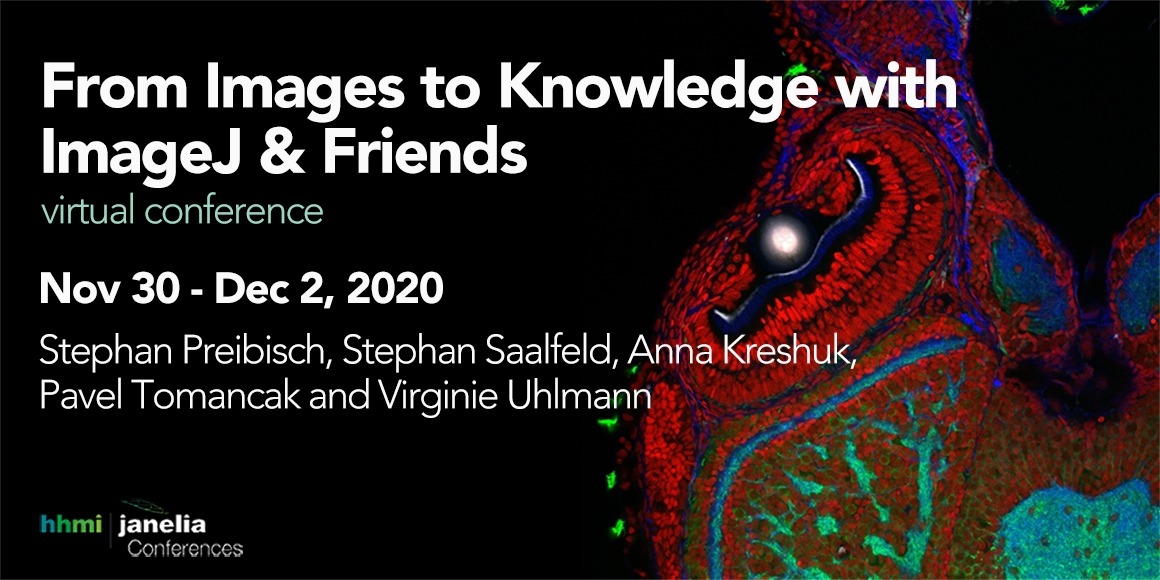From Images to Knowledge with ImageJ & Friends
Check our final workshop program.
Discovery in the life-sciences increasingly relies on quantitative analysis of microscopy images. The 2020 virtual workshop “From Images to Knowledge (I2K)”, to be held from November 30 to December 2, will therefore focus on in-depth interactive tutorials covering state-of-the-art open source solutions for biological image reconstruction and analysis, as well as social interaction between developers, researchers, and students. It will be a forum to learn about and discuss forward looking strategies for dealing with the ever increasing amount of large and content rich microscopy imagery.
As all major open source platforms for bioimage analysis will be represented, this will be a great opportunity to learn how to use the best software tools for your research and how to get involved in their development! We will have an exciting number of leaders and rising stars in the field of computational image analysis participating in the workshop, both as tutors and social participants. I2K will therefore be a unique chance to get in touch with them in person.
Topics will include:
- Bioimage analysis workflows
- Computer vision and machine learning
- Handling of big image data
- Image data annotation and sharing
- Image data visualization
- Image restoration, registration, segmentation, and tracking
- Smart microscopy
- Open software engineering
I2K is for (i) researchers and students who are generating or analyzing large and/ or complex image data, (ii) scientists creating tools and methods to solve image analysis problems, and (iii) software engineers who provide and maintain the necessary infrastructure.
Structure
Tutorials
We will use Zoom hosted by HHMI Janelia to hold the tutorials. This enables video+audio communication, screen-sharing, and chats. Each tutorial will last up to 4h and will be held twice, once in the morning hours of the tutor’s work-day and once in evening hours of the tutor’s work-day. This guarantees that participants around the planet have access to each tutorial at a reasonable time during their day.
Each tutorial will host a small to medium size group of students between 10 and 20 participants. This small group size enables all participants to interact with each other and with the tutor in real time. Since each tutorial is held twice, it will be available for 2× #participating students. All tutorials will be recorded and will be made available to the public via YouTube or another free video streaming service. Several tutorials will be held concurrently.
Attendees will apply to participate in tutorials at a given time-slot providing a small paragraph describing their background and motivation to join the tutorial. Tutors, together with workshop organizers, will select and assign students to tutorials optimizing for preference and availability.
Workshop organizers will help tutors to make sure that technical requirements can be met. One workshop organizer/ assistant will be available during each tutorial to help with technical and administrative issues (including recording). Tutorials will be distributed over the three days from Monday, November 30 through Wednesday, December 2, 2020 at the time of day that the tutor proposed.
Meet your peers
Social interaction will be facilitated through a virtual conference venue that will be open through out the workshop. We encourage school participants to be available in the virtual conference venue at specified socializing times but you can also meet at any other time there. Senior attendees (PIs, tutors, organizers) will be encouraged to make themselves available to younger attendees by joining the virtual venue regularly. We also envision that this venue will be used for paired or group programming sessions, so that people who usually do not work together are enabled to do so on a specific problem, framework, or language.
Organizers
Stephan Preibisch, Janelia Research Campus/HHMI
Stephan Saalfeld, Janelia Research Campus/HHMI
Anna Kreshuk, European Molecular Biology Laboratory
Pavel Tomancak, Max Planck Institute of Molecular Cell Biology and Genetics
Virginie Uhlmann, European Molecular Biology Laboratory
Stay Updated
Sign up to receive periodic updates and announcements about Janelia’s programs and events, including conferences and workshops, public lectures, educational and career opportunities, and more.
Some session recordings are available now. Please check the Workshop program for the links. We will update the list as more recordings are getting uploaded.
We matched all 873 applications with 81 interactive tutorial sessions. We were able to match all but 9 applicants with 1 to 3 of their choices. All sessions are at capacity. Tutorial sessions will be recorded and later made available to the public. We are looking forward to seeing everybody at the workshop!
Conference Childcare
Janelia offers safe and reliable onsite daycare for the children of our conference attendees in our Children's Learning Laboratory, with personalized care and extended hours to accommodate the conference schedule. Read more about our childcare options.


